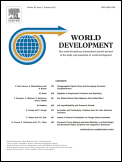In a very good article in the latest issue of Science, Jo Swinnen and one of his coauthors explain that, as with many other changes in economic circumstances, rising food prices are a boon to some people and a bane to others. Here is the summary:
Spikes in food prices have pushed food security to the top of the global policy agenda. Price increases have mixed effects on poverty and hunger: They increase the cost of food for consumers but increase incomes of farmers, who represent the bulk of the world’s poor. Net effects will differ depending on whether poor households or countries buy or import, or sell or export food (infrastructure, institutions, and market imperfections will play roles, as well). Policies to influence prices imply winners and losers, not just between rich and poor, but also among the poor. These nuances are too often absent in public debate, to the detriment of policy-making. Moreover, the arguments put forward today, that high food prices generally hurt the poor, are in contrast with those put forward a few years ago, that low food prices were hurting the poor.
Put simply, when food prices rise, food producers benefit and food consumers lose out. But while the media used to causally link low food prices to poverty and hunger, it was high food prices instead that were blamed for poverty and hunger during the food crises of 2008 and of 2010-2011.
